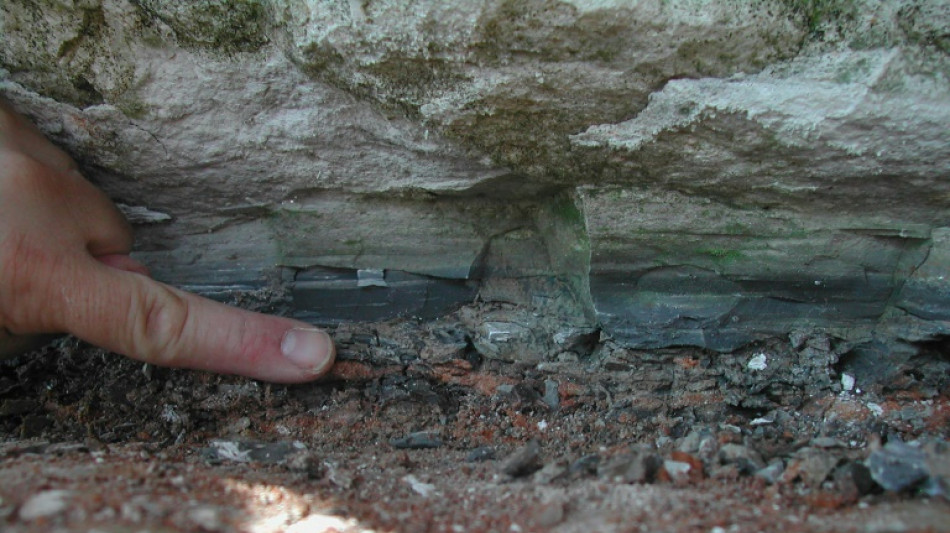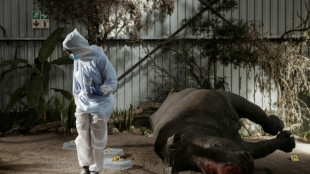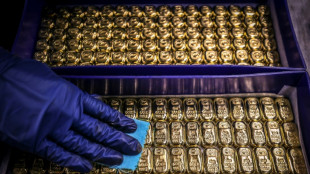
-
 Iyer, Kishan win back India contracts as Pant's deal upgraded
Iyer, Kishan win back India contracts as Pant's deal upgraded
-
Vance lands in India for tough talks on trade

-
 Inside South Africa's wildlife CSI school helping to catch poachers
Inside South Africa's wildlife CSI school helping to catch poachers
-
Nigerian Afrobeat legend Femi Kuti takes a look inward

-
 Kim Kardashian: From sex tape to Oval Office via TV and Instagram
Kim Kardashian: From sex tape to Oval Office via TV and Instagram
-
Vance in India for tough talks on trade

-
 Thunder crush Grizzlies as Celtics, Cavs and Warriors win
Thunder crush Grizzlies as Celtics, Cavs and Warriors win
-
Vance heads to India for tough talks on trade

-
 China slams 'appeasement' of US as nations rush to secure trade deals
China slams 'appeasement' of US as nations rush to secure trade deals
-
'Grandpa robbers' go on trial for Kardashian heist in Paris

-
 Swede Lindblad gets first win in just third LPGA start
Swede Lindblad gets first win in just third LPGA start
-
Gold hits record, dollar drops as tariff fears dampen sentiment

-
 As Dalai Lama approaches 90, Tibetans weigh future
As Dalai Lama approaches 90, Tibetans weigh future
-
US defense chief shared sensitive information in second Signal chat: US media

-
 Swede Lingblad gets first win in just third LPGA start
Swede Lingblad gets first win in just third LPGA start
-
South Korea ex-president back in court for criminal trial

-
 Thunder crush Grizzlies, Celtics and Cavs open NBA playoffs with wins
Thunder crush Grizzlies, Celtics and Cavs open NBA playoffs with wins
-
Beijing slams 'appeasement' of US in trade deals that hurt China

-
 Trump in his own words: 100 days of quotes
Trump in his own words: 100 days of quotes
-
Padres say slugger Arraez 'stable' after scary collision

-
 Trump tariffs stunt US toy imports as sellers play for time
Trump tariffs stunt US toy imports as sellers play for time
-
El Salvador offers to swap US deportees with Venezuela

-
 Higgo holds on for win after Dahmen's late collapse
Higgo holds on for win after Dahmen's late collapse
-
El Salvador's president proposes prisoner exchange with Venezuela

-
 Gilgeous-Alexander, Jokic, Antetokounmpo named NBA MVP finalists
Gilgeous-Alexander, Jokic, Antetokounmpo named NBA MVP finalists
-
Thomas ends long wait with playoff win over Novak

-
 Thunder rumble to record win over Grizzlies, Celtics top Magic in NBA playoff openers
Thunder rumble to record win over Grizzlies, Celtics top Magic in NBA playoff openers
-
Linesman hit by projectile as Saint-Etienne edge toward safety

-
 Mallia guides Toulouse to Top 14 win over Stade Francais
Mallia guides Toulouse to Top 14 win over Stade Francais
-
Israel cancels visas for French lawmakers

-
 Russia and Ukraine trade blame over Easter truce, as Trump predicts 'deal'
Russia and Ukraine trade blame over Easter truce, as Trump predicts 'deal'
-
Valverde stunner saves Real Madrid title hopes against Bilbao

-
 Ligue 1 derby interrupted after assistant referee hit by projectile
Ligue 1 derby interrupted after assistant referee hit by projectile
-
Leclerc bags Ferrari first podium of the year

-
 Afro-Brazilian carnival celebrates cultural kinship in Lagos
Afro-Brazilian carnival celebrates cultural kinship in Lagos
-
Ligue 1 derby halted after assistant referee hit by projectile

-
 Thunder rumble with record win over Memphis in playoff opener
Thunder rumble with record win over Memphis in playoff opener
-
Leverkusen held at Pauli to put Bayern on cusp of title

-
 Israel says Gaza medics' killing a 'mistake,' to dismiss commander
Israel says Gaza medics' killing a 'mistake,' to dismiss commander
-
Piastri power rules in Saudi as Max pays the penalty

-
 Leaders Inter level with Napoli after falling to late Orsolini stunner at Bologna
Leaders Inter level with Napoli after falling to late Orsolini stunner at Bologna
-
David rediscovers teeth as Chevalier loses some in nervy Lille win

-
 Piastri wins Saudi Arabian Grand Prix, Verstappen second
Piastri wins Saudi Arabian Grand Prix, Verstappen second
-
Kohli, Rohit star as Bengaluru and Mumbai win in IPL

-
 Guirassy helps Dortmund past Gladbach, putting top-four in sight
Guirassy helps Dortmund past Gladbach, putting top-four in sight
-
Alexander-Arnold lauds 'special' Liverpool moments

-
 Pina strikes twice as Barca rout Chelsea in Champions League semi
Pina strikes twice as Barca rout Chelsea in Champions League semi
-
Rohit, Suryakumar on song as Mumbai hammer Chennai in IPL

-
 Dortmund beat Gladbach to keep top-four hopes alive
Dortmund beat Gladbach to keep top-four hopes alive
-
Leicester relegated from the Premier League as Liverpool close in on title


Scientists pinpoint dino-killing asteroid's origin: past Jupiter
An intense debate surrounding the cosmic rock that killed the dinosaurs has stirred scientists for decades, but a new study has revealed some important -- and far-out -- data about the impactor's origin story.
Researchers, whose findings were published Thursday in the journal Science, used an innovative technique to demonstrate that the apocalyptic culprit which slammed into the Earth's surface 66 million years ago, causing the most recent mass extinction, had formed beyond Jupiter's orbit.
They also refute the idea that it was a comet.
The new insights into the apparent asteroid that cratered into Chicxulub, in what is present-day Mexico's Yucatan Peninsula, could improve the understanding of celestial objects that have struck our planet.
"Now we can, with all this knowledge... say that this asteroid initially formed beyond Jupiter," Mario Fischer-Godde, lead author of the study and a geochemist at the University of Cologne, told AFP.
The conclusions are particularly notable, given how rarely this type of asteroid collides with Earth.
Such information may well prove useful in assessing future threats, or determining how water arrived on this planet, Fischer-Godde said.
- Samples -
The new findings are based on analysis of sediment samples formed at the period between the Cretaceous and Paleogene eras, the time of the asteroid's cataclysmic impact.
Researchers measured the isotopes of the element ruthenium, not uncommon on asteroids but extremely rare on Earth. So by inspecting the deposits in multiple geological layers that mark the debris from the impact at Chicxulub, they could be sure that the ruthenium studied came "100 percent from this asteroid."
"Our lab in Cologne is one of the rare labs that can do these measurements," and it was the first time such study techniques were used on impact debris layers, Fischer-Godde said.
Ruthenium isotopes can be used to distinguish between the two main groups of asteroids: C-type, or carbonaceous, asteroids that formed in the outer solar system, and S-type silicate asteroids from the inner solar system, nearer the sun.
The study affirms that the asteroid that triggered a mega-earthquake, precipitated a global winter and wiped out the dinosaurs and most other life, was a C-type asteroid that formed beyond Jupiter.
Studies from two decades ago had already made such an assumption, but with far less certainty.
The conclusions are striking, because most meteorites -- pieces of asteroids that fall to Earth -- are S-types, Fischer-Godde pointed out.
Does that mean the Chicxulub impactor formed beyond Jupiter and made a beeline for our planet? Not necessarily.
"We cannot be really sure where the asteroid was kind of hiding just before it impacted on Earth," Fischer-Godde said, adding that after its formation, it may have made a stopover in the asteroid belt, located between Mars and Jupiter and where most meteorites originate.
- Not a comet -
The study also dismisses the idea that the destructive impactor was a comet, an amalgam of icy rock from the very edge of the solar system. Such a hypothesis was put forward in a much-publicized study in 2021, based on statistical simulations.
Sample analyses now show that the celestial object was far different in composition from a subset of meteorites which are believed to have been comets in the past. It is therefore "unlikely" the impactor in question was a comet, Fischer-Godde said.
As to the wider usefulness of his findings, the geochemist offered two suggestions.
He believes that more accurately defining the nature of asteroids that have struck Earth since its beginnings some 4.5 billion years ago could help solve the enigma of the origin of our planet's water.
Scientists believe water may have been brought to Earth by asteroids, likely of the C-type like the one that struck 66 million years ago, even though they are less frequent.
Studying past asteroids also allows humanity to prepare for the future, Fischer-Godde said.
"If we find that earlier mass extinction events could also be related to C-type asteroid impacts, then... if there's ever going to be C-type asteroid on an Earth-crossing orbit, we have to be very careful," he said, "because it might be the last one we witness."
B.Wyler--VB



